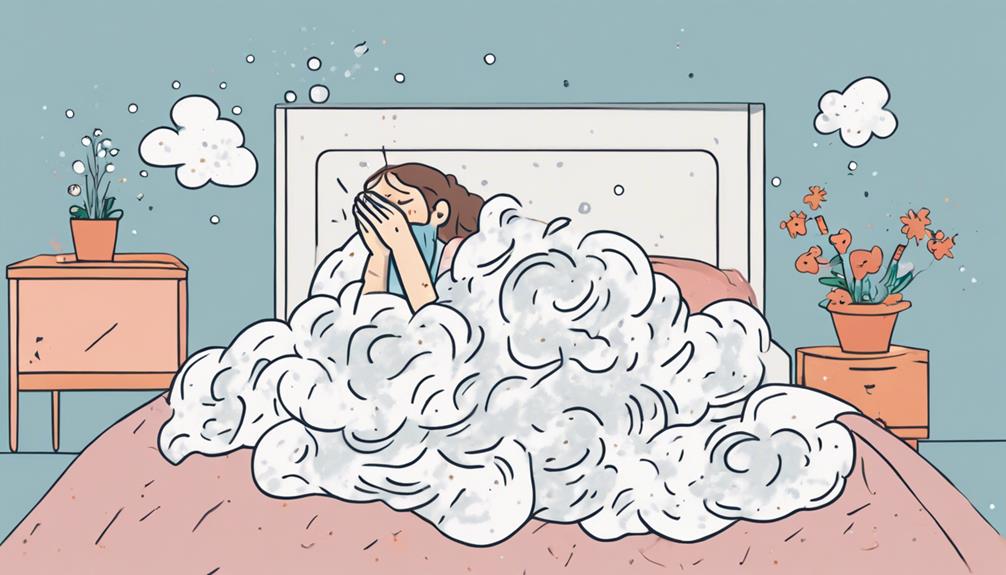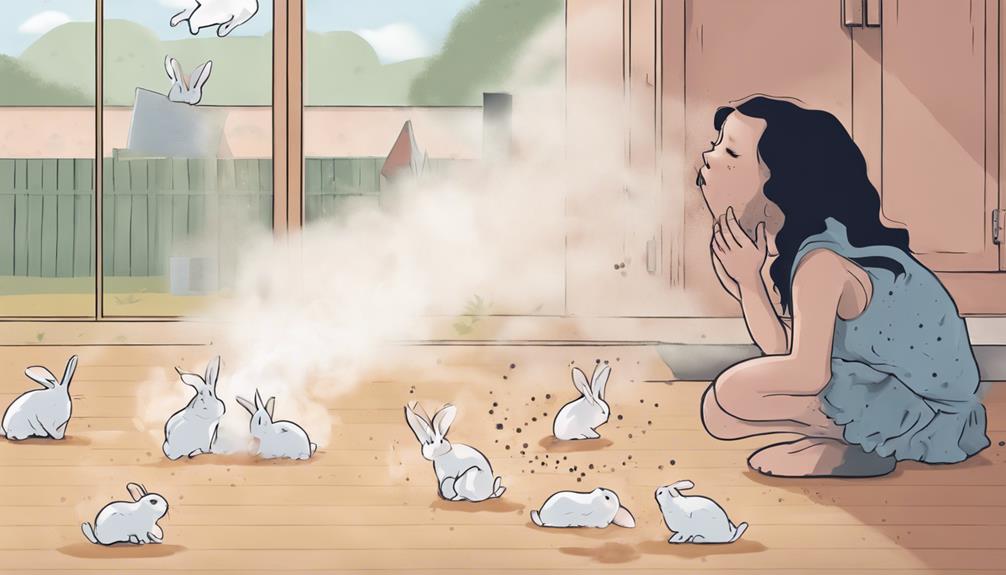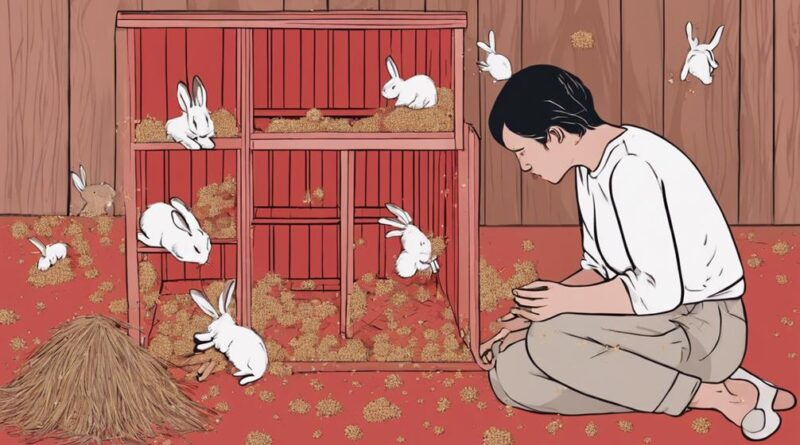10 Ways Rabbits Can Trigger Allergies in Humans
Rabbits can trigger allergies in humans through fur and dander, causing sneezing and itching. Saliva proteins may lead to skin irritation and itching upon contact. Rabbit urine proteins can cause sneezing, coughing, and skin irritation. Allergies to hay proteins can result in sneezing, coughing, and itchy eyes. Shedding and skin cells may trigger reactions, managed by grooming and air purifiers. Environmental triggers include bedding irritants, grooming techniques, litter dust, and enclosure molds. Consult a vet for allergen management. Understanding these triggers can help you minimize allergic reactions and ensure a healthier environment for both you and your furry friend.
Rabbit Fur and Dander
If you're allergic to rabbits, their fur and dander can trigger symptoms such as sneezing and itching. These allergens are often the primary culprits for triggering allergic reactions in individuals who are sensitive to them. Rabbit fur can carry dander, which is a common allergen that can cause respiratory issues and skin irritation in some people.
To minimize the impact of rabbit fur and dander allergies, proper pet grooming practices are essential. Regularly grooming your indoor pets can help reduce the amount of loose fur and dander that they shed, subsequently lowering the allergen levels in your living environment. Brushing your rabbit's fur frequently can help trap loose fur before it's shed, minimizing the amount of allergens present in the air.
When it comes to indoor pets like rabbits, ensuring a clean living space is crucial in managing allergies. Vacuuming and dusting frequently can help remove accumulated fur and dander from your home. Additionally, washing your rabbit's bedding and toys regularly can further reduce allergen exposure. Maintaining a clean and well-ventilated living environment can significantly alleviate symptoms related to rabbit fur and dander allergies.
Rabbit Saliva Allergies
Rabbit saliva contains proteins that can trigger allergic reactions in sensitive individuals. When sensitive individuals come into contact with rabbit saliva proteins, they may experience symptoms such as itching and skin irritation. These reactions are due to saliva protein sensitivities that can lead to discomfort and allergic responses.
One common scenario where individuals may encounter rabbit saliva is during grooming sessions. Rabbits groom themselves by licking their fur, and during this process, they deposit saliva on their coats. If you come into contact with a rabbit that has saliva on its fur, especially if you pet or handle the rabbit, the saliva proteins can transfer onto your skin. This direct contact with rabbit saliva can lead to allergic reactions, particularly in individuals who are sensitive to these proteins.
It's essential to be mindful of allergic reactions to grooming when interacting with rabbits, especially if you're prone to allergies. If you notice any itching, redness, or skin irritation after being in contact with a rabbit, it's advisable to wash the affected area thoroughly and seek medical advice if the symptoms persist or worsen. By understanding the potential for allergic reactions to rabbit saliva proteins, you can take steps to minimize exposure and manage any associated symptoms effectively.
Rabbit Urine Sensitivities
The presence of proteins in rabbit urine can elicit allergic reactions in individuals sensitive to these substances. When rabbits urinate, they release proteins that can become airborne or come into contact with surfaces in their environment. These proteins are known to trigger allergic responses in some people, particularly those with sensitivities to animal urine.
Indoor air quality can be significantly affected by the presence of rabbit urine in a household. When the proteins in rabbit urine become airborne, they can circulate within indoor spaces, contributing to a decrease in air quality. For individuals with respiratory health issues, such as asthma or allergies, exposure to these proteins can exacerbate symptoms and lead to discomfort.
Those who are sensitive to rabbit urine proteins may experience symptoms such as sneezing, coughing, wheezing, nasal congestion, and skin irritation upon exposure. It's essential to address rabbit urine sensitivities promptly to maintain a healthy indoor environment and minimize the risk of respiratory reactions. Regular cleaning and proper ventilation can help reduce the presence of airborne proteins and improve indoor air quality for individuals with sensitivities to rabbit urine.
Rabbit Hay Allergies
Hay used for rabbit bedding and feeding can trigger allergic reactions in humans sensitive to the proteins present in the material. The proteins in hay are known to be potent allergens, capable of causing symptoms such as sneezing, coughing, wheezing, itchy eyes, and skin rashes in susceptible individuals. Hay storage can also play a role in exacerbating these allergies, as mold spores present in improperly stored hay can further irritate the respiratory system and skin.
To determine if your allergies are triggered by rabbit hay, allergy testing can be conducted. Allergy testing involves skin prick tests or blood tests to identify specific allergens that may be causing your symptoms. If hay proteins are identified as the source of your allergies, it's essential to minimize exposure by wearing a mask while handling hay, using gloves, and ensuring proper ventilation in areas where hay is stored or used for bedding.
Proper hay storage practices, such as keeping hay in dry, well-ventilated areas and regularly cleaning storage containers, can help reduce the risk of mold growth and allergen exposure. If allergies persist despite these measures, consulting an allergist for further evaluation and management is recommended.
Rabbit Shedding and Skin Cells
Exposure to rabbit shedding and skin cells can elicit allergic reactions in individuals sensitive to animal dander. Rabbit shedding can release tiny particles of dander into the air, which may contain proteins that trigger allergic responses in some people. These allergens can come into contact with your skin, eyes, or respiratory system, leading to a range of symptoms such as sneezing, itching, or skin irritation.
To manage rabbit shedding and minimize the risk of allergic reactions, several strategies can be implemented. Regular grooming of your rabbit can help reduce the amount of loose fur and skin cells in their environment. Brushing your rabbit outside or in a well-ventilated area can also limit the dispersal of allergens indoors. Additionally, using a HEPA air purifier in the room where the rabbit spends the most time can help filter out airborne particles, including dander.
When handling your rabbit, wearing gloves and a mask can provide a physical barrier between you and the allergens, decreasing the likelihood of skin irritation or respiratory symptoms. Washing your hands thoroughly after interacting with your rabbit can further minimize exposure to allergens. By implementing shedding management practices and maintaining good hygiene, you can reduce the risk of allergic reactions caused by rabbit shedding and skin cells.
Rabbit Food Allergens
Regularly feeding your rabbit different types of hay and vegetables can introduce a variety of potential food allergens that may trigger allergic reactions in sensitive individuals. Rabbit food sensitivities aren't uncommon and can manifest as allergic reactions to rabbit treats. These sensitivities can be attributed to various components present in their diet, such as proteins, carbohydrates, or even certain additives.
Hay is a staple in a rabbit's diet, but it can also be a source of allergens. Some rabbits may exhibit allergic reactions to specific types of hay, like Timothy hay or alfalfa. These reactions can range from mild symptoms like sneezing or watery eyes to more severe manifestations such as skin rashes or gastrointestinal issues.
Vegetables, while essential for a balanced rabbit diet, can also harbor allergenic properties. Allergic reactions to rabbit treats like carrots, leafy greens, or root vegetables are possible. These reactions are often linked to individual sensitivities to certain proteins or enzymes present in these foods.
To mitigate the risk of allergic reactions in rabbits, it's advisable to introduce new foods gradually and observe for any adverse responses. Consulting with a veterinarian can also help identify specific food allergens and formulate a suitable diet plan for your rabbit. By being attentive to potential food sensitivities, you can ensure your rabbit's well-being and minimize the risk of allergic reactions.
Rabbit Bedding Irritants

Introducing new elements into your rabbit's environment, such as bedding materials, can potentially expose them to irritants that may trigger allergic reactions in sensitive individuals. Rabbit bedding irritants can contribute to respiratory symptoms and skin irritation in humans who are prone to allergies.
Respiratory symptoms such as sneezing, coughing, wheezing, and shortness of breath can be triggered by certain bedding materials used in a rabbit's habitat. Dust particles from bedding like hay, straw, or wood shavings can become airborne, leading to respiratory issues in individuals sensitive to these allergens. Inhaling these particles can irritate the airways, causing discomfort and breathing difficulties.
Moreover, skin irritation is another common allergic reaction that can be provoked by rabbit bedding irritants. Contact with certain bedding materials may cause redness, itching, or rashes on the skin of susceptible individuals. This can be particularly troublesome for individuals with sensitive skin or pre-existing skin conditions.
To mitigate these risks, it's essential to choose bedding materials carefully, opting for low-dust options and avoiding materials known to trigger allergic reactions. Regularly cleaning the rabbit's living space and ensuring proper ventilation can also help reduce the presence of irritants in the environment. If allergic symptoms persist, consulting with a healthcare provider for proper diagnosis and management is advisable.
Rabbit Grooming Allergies
Rabbit grooming practices may inadvertently trigger allergic reactions in susceptible individuals due to exposure to allergens present in the rabbit's fur and skin. To prevent such allergic reactions, it's essential to employ proper grooming techniques and tools.
- Grooming techniques: When grooming your rabbit, avoid excessive rubbing or brushing, as this can release more allergens into the air. Opt for gentle grooming motions to minimize the spread of allergenic particles.
- Skin reactions: Allergic reactions to rabbit grooming can manifest as skin rashes, hives, or itching. If you notice any skin irritation after grooming your rabbit, wash the affected area with mild soap and water and consider wearing gloves during future grooming sessions.
- Allergy prevention: To reduce the risk of allergic reactions during grooming, consider wearing a mask to minimize inhalation of allergens. Additionally, grooming your rabbit in a well-ventilated area can help disperse allergenic particles more effectively.
- Grooming tools: Use grooming tools specifically designed for rabbits to minimize the release of allergens. Regularly clean and disinfect grooming tools to prevent the buildup of allergenic particles on their surfaces.
Rabbit Litter Dust Reactions

When handling rabbit litter, be cautious of potential allergic reactions triggered by the dust present in the litter material. Dust mite sensitivities and environmental allergies are common triggers for individuals who come into contact with rabbit litter dust. The fine particles in the dust can easily become airborne when disturbed, posing a risk to those with sensitivities.
Dust mites are microscopic organisms that thrive in warm and humid environments, such as rabbit litter. When the litter is disturbed, these mites can become airborne, leading to reactions in susceptible individuals. Symptoms may include sneezing, coughing, itchy eyes, and even skin rashes. It's essential to use precautions such as wearing a mask and gloves when handling rabbit litter to minimize exposure to these allergens.
Environmental allergies, including those triggered by rabbit litter dust, can exacerbate existing respiratory conditions like asthma. The dust particles can irritate the airways, leading to difficulty breathing and wheezing in sensitive individuals. Proper ventilation and regular cleaning of the rabbit's living area can help reduce the buildup of dust and allergens.
Rabbit Enclosure Mold Triggers
Disturbing mold within a rabbit enclosure can trigger allergic reactions in susceptible individuals due to the release of spores into the air. Mold prevention and proper enclosure maintenance are crucial to safeguard respiratory health. Here are some key points to consider when dealing with rabbit enclosure mold triggers:
- Regular Cleaning: Mold thrives in damp and dark environments. Ensure you clean your rabbit's enclosure regularly and remove any soiled bedding promptly to prevent mold growth.
- Ventilation Strategies: Proper ventilation is essential to reduce moisture levels within the enclosure. Consider using fans or opening windows to improve air circulation and prevent mold from developing.
- Dry Environment: Keep the rabbit's living area dry by using absorbent bedding materials and replacing them frequently. Moist conditions promote mold growth, leading to potential respiratory issues.
- Inspect for Mold: Regularly inspect the enclosure for any signs of mold growth. If you notice any mold, clean the affected area thoroughly with appropriate cleaning solutions and ensure it's completely dry before reintroducing your rabbit.
Frequently Asked Questions
Can Allergies to Rabbits Be Passed Through Genetics?
If you have a genetic predisposition to allergies, there's a possibility that rabbit allergies can be passed down in your family.
While genetics play a role, environmental factors also influence the development of rabbit allergies. Exposure to rabbits and their dander can trigger allergic reactions in susceptible individuals.
It's essential to consider both genetic and environmental influences when understanding how allergies to rabbits can manifest within families.
Are There Specific Breeds of Rabbits That Are Hypoallergenic?
When choosing a rabbit breed, consider hypoallergenic options. Some breeds, like the Rex or Mini Rex, have shorter fur that sheds less, reducing the spread of dander. This can help minimize allergic reactions in sensitive individuals.
How Can I Reduce Rabbit Allergy Symptoms at Home?
To reduce rabbit allergy symptoms at home, consider using air purifiers to help filter out allergens like dander and fur.
Regular pet grooming, such as brushing your rabbit frequently and keeping their living area clean, can also minimize the spread of allergens.
These practices may help alleviate your symptoms and create a more comfortable environment if you're sensitive to rabbit allergens.
Can Allergy Shots Help With Rabbit Allergies?
Allergy shots, also known as immunotherapy, can be an effective alternative treatment for managing rabbit allergies. These shots work by gradually exposing your body to the allergen, helping to build up tolerance over time.
In addition to immunotherapy, making lifestyle changes and following prevention tips such as keeping your living space clean, using air purifiers, and minimizing contact with rabbits can also help reduce allergy symptoms.
Can Rabbits Trigger Asthma Attacks in Susceptible Individuals?
Rabbit fur contains proteins that can be asthma triggers for susceptible individuals. When rabbits shed dander, these particles can become airborne and potentially lead to asthma attacks in those sensitive to them.
It's crucial to minimize exposure by keeping rabbits in well-ventilated areas, regularly cleaning their living spaces, and washing your hands after handling them. Consult with a healthcare provider for personalized advice on managing asthma triggered by rabbit dander.
Conclusion
In conclusion, rabbits can trigger allergies in humans through various means such as their fur, saliva, urine, hay, shedding, grooming, bedding, litter, and enclosure mold.
It's important for individuals with allergies to rabbits to take necessary precautions, such as keeping their living area clean and well-ventilated, to minimize exposure to allergens.
Understanding these triggers can help individuals better manage their allergies and enjoy the companionship of rabbits in a safe manner.
